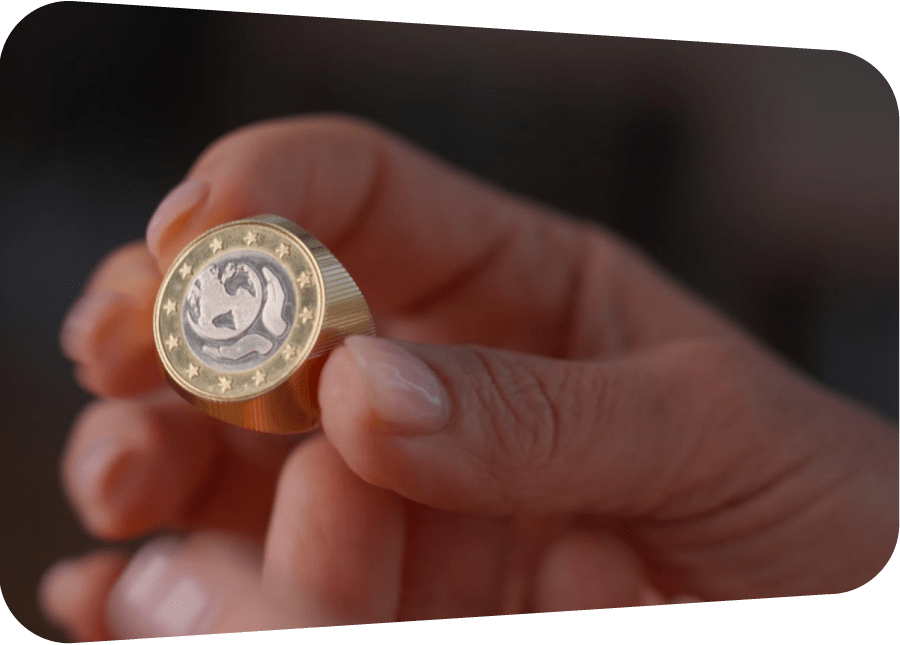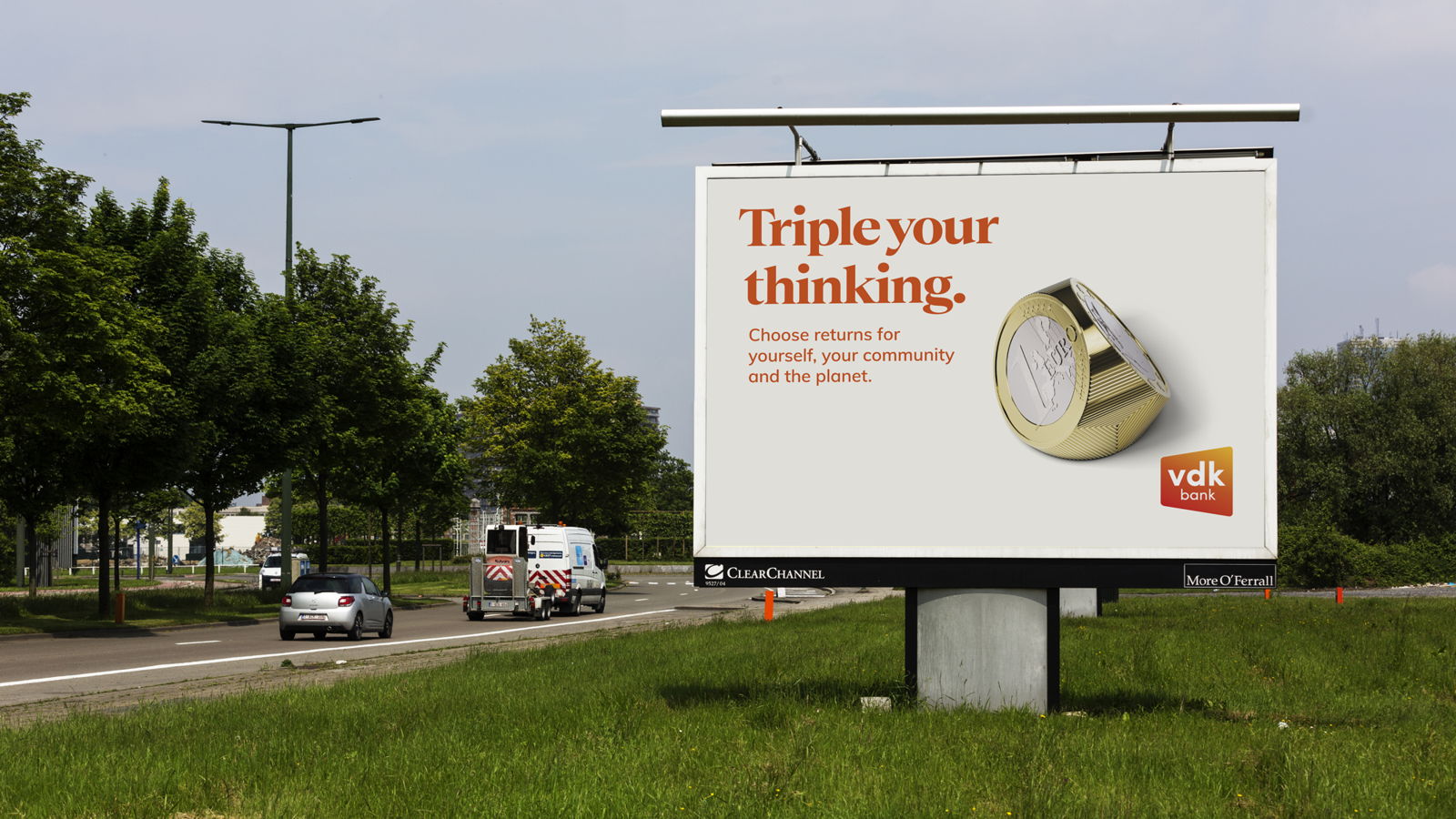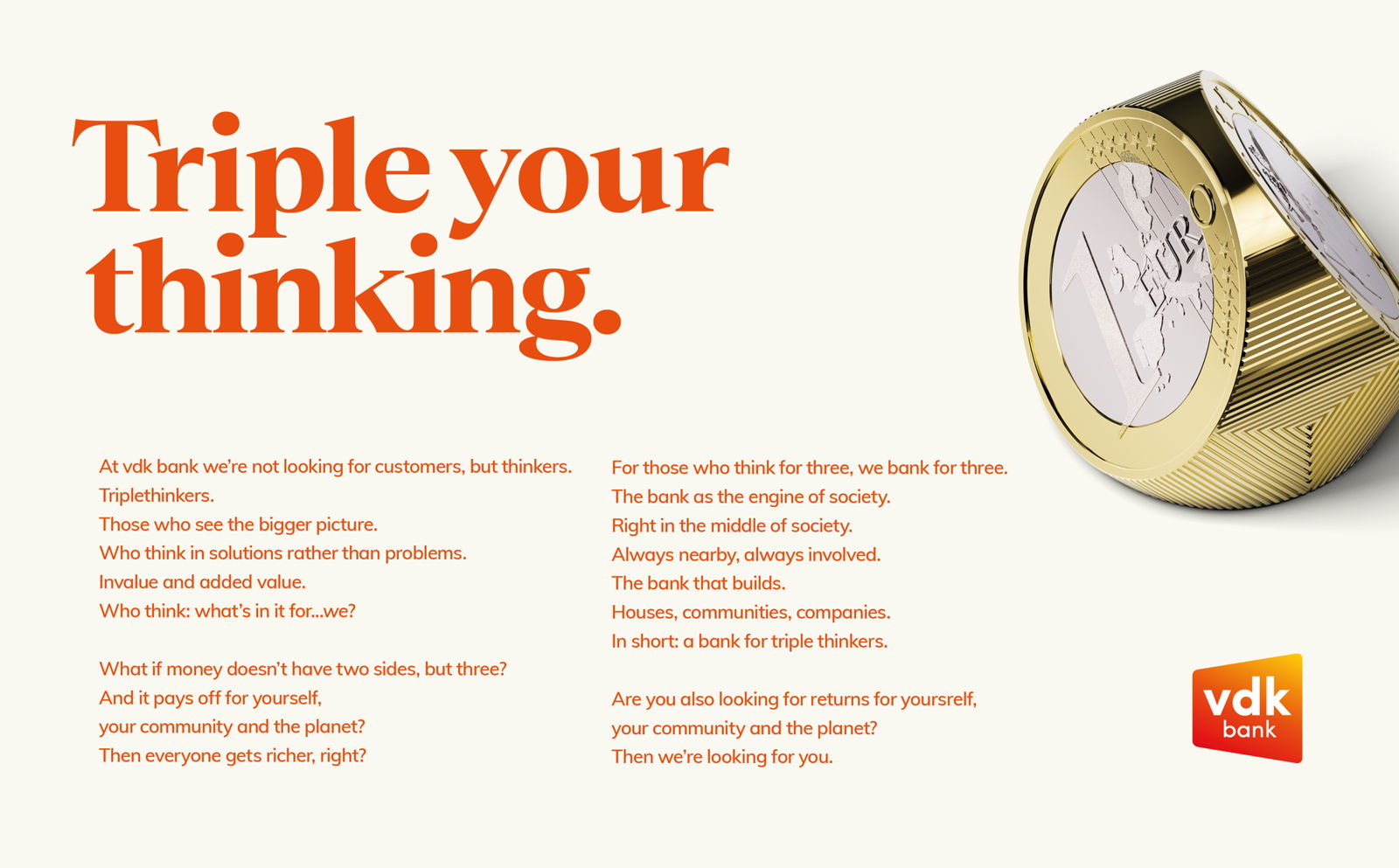
I recently was introduced to VDK Bank, a community bank based in Ghent, Belgium, by Rik Coeckelbergs. The bank has done something interesting, launching a three-sided coin. The idea is to triple your thinking. The three-dimensional bank focuses upon customer, community and then the third dimension is to think about how money impacts the planet.
When discussing this with the bank, they highlight the fact that most people talk about money as though it has just two sides: “heads versus tails, bull versus bear, profit versus loss. We asked ourselves: what if money had three sides? With the third side representing the impact your money can have on society and the planet”.
You can find out more about the background here, but it was great to talk with Leen Van den Neste, the CEO of the bank, the other day to hear exactly how the campaign has leverage the bank’s founding principles of community-focused action.
Chris Skinner:
I’ve been spending a lot of time talking around how finance and technology can come together to make the world a better place, and became aware that this is central to you and your bank’s thinking when you launched the three dimensional coin. Is it a marketing gimmick or has it had an impact?
Leen Van den Neste:
Well, it definitely had an impact. It’s going around the world actually. A lot of people picked it up. We had press in Istanbul and in a lot of different European and even beyond Europe exposure. We had a good press in Belgium also. The people who made it, it was really, craftsmanship. It was real handmade craftsmen who made it for us. We made a good video on it. Did you see that one, how it was produced?
Chris Skinner:
I saw it on the website
Nice work!
Leen Van den Neste:
Other than that, we use the three sides to explain how we bank and what the three sides refer to. The customer is important of course, and we show that we provide the customer with a good interest rate for their money. They deposit with us, and we reinvest their money in our own community. Community is also a priority and includes the environment and the region where we live. So we finance universities, schools, clinics, retirement homes. That’s really our social impact nearby the bank. And then the planet focuses upon a third dimension. We really don’t want to invest in oil and fossils fuels and stuff like that. So we really have a good policy on that.
That’s on our website also. We communicate very publicly in what companies we invest with the name of the company of course, so that the customer approves that this company is mentioned on our website. So the whole list of companies we finance is shared, including some very big companies.
This is because the obligations we have, it’s all very transparent on our website. If somebody says you are not that green or, as you call it, the greenwashing team, because you invest in our company, we will talk about it. If the person in question is right about our investment being wrong, then we will sell the bond we have on that company. So yeah, maybe this three-sided coin is a marketing gimmick, but there is a big story behind it that explains it all.
Chris Skinner:
My impression of VDK Bank, a bit like with some other community banks, is that these values of community and planet are embedded in the core principles of how you started. You started very much as a community focused bank.
Leen Van den Neste:
We were founded by syndicates. So the workers in Ghent who didn’t have a bank of their own, because big banks weren’t interested in the blue collar workers, it was that syndicate who founded us. This is back in 1926 and it is in our DNA. We are going to keep on working like that, especially now with the challenges we have on climate.
We found that people who used to be able to buy a house well, now, they have the obligation when they buy an older house with a bad energy level, they have to invest in it to give it a better energy label. That investment must be made within the first five years of buying the house. And so we realised that these younger people who, before were able to buy a house, are now no longer able to buy a house because of the big challenge they have with making it energy efficient. That is a big challenge for a young buyer and so we’re really working on that now.
Due to these themes of ethical and durable banking, we have to reinvent ourselves constantly. They’re constantly new themes and that’s good. We really have to keep on working on that.
Chris Skinner:
So you chair the executive committee and lead the bank, and I guess a lot of the three sided coin and what we are discussing comes from your own passion. How can you bring that passion to the bigger banks?
Leen Van den Neste:
That is a very good question. I only talk about my bank by principle. I don’t want to discuss other banks or how they work. And I hope that that gives already some influence of the passion where we work with, and you talk about me, but I can assure you this is a theme that goes through all the bank. Everybody knows, and every coworker has been given this coin and the story behind it. So they all know what it’s about. And when we hire new people, we explain that if they don’t feel the connection on that point, or we don’t feel the connection on that point, then we’re not going to accept them.
So that’s the way I know there’s a lot of work to be done, not only with other banks, but also with insurance companies and, more widely, the global corporate society where a lot of companies are not aware of the big challenges we are facing. I feel it’s my job and my passion to talk a lot about it, about what we can do to change a lot of the future that’s coming towards us.
Chris Skinner:
How would this be represented digitally or is it purely the coin?
Leen Van den Neste:
Our main focus, and we haven’t talked about that so far, is that we keep on working through branches. We open branches while most of the banks in Belgium and throughout Europe, close branches. We open branches. The personal communication with our customer is very important to us. Banking goes by trust.
It’s having confidence that the customer can rely on us to do a good investment with their savings. But on the contrary also, when we finance them and it’s our confidence in them that means they will repay us.
The banking is a relationship of trust, and we are convinced that trust only grows through a personal touch, not digitally.
Chris Skinner:
That’s interesting as most large banks view the customer as a transactional relationship rather than a human relationship and it’s the human relationship that the branch sustains. But a lot of people will tell me, you can do that digitally. You don’t need a physical distribution resource for that human relationship of trust.
Leen Van den Neste:
I’m not convinced of that.
We are a service driven company, so people come to us for an explanation. For example, when somebody dies in the family. That’s a very important moment. It’s a very emotional moment. We have to be there to help them administratively. There’s a lot of administration to be done at that moment.
We know that a lot of service companies have a different angle. I mean even also insurance companies. They all think it can be done digitally, but there are certain moments where it is important to have somebody to slap your shoulder; to say, you’ll be all right. Someone who can look you in the eyes and say: your money’s safe with me. Or the customer looks us in the eyes and says, I will refund your loan. You can depend on me.
Those are moments that make it worthwhile for our workers. Our workers do not want to have only digital contacts. They want to work with people. And that’s why I think it’s very important.
Everybody says over the last 30 years, everybody says to us, you will not survive. You will not survive the war that other banks are forming. I’m convinced that there will always be people who want to work with people instead of with machines, when it’s banking concerned.
Chris Skinner:
Which brings me back to the 3D coin and one of the comments made is that a lot of banking is looked at in two dimensions: heads and tails, bulls and bears, profit and loss. When you bring in a third dimension, extending into community and planet, it’s very different. But I only find that discussion that we are having about branches and about delivering to community and planet with what I would call mutuals, the sort of banks that are very community oriented. Meanwhile, we have an awful lot of discussion about the biggest banks in the world and their investments in fossil fuel industries. Again, how can we bring this three dimensional thinking to the largest banks?
Leen Van den Neste:
Well, a lot of harm is done by the shareholder approach. Our shareholders are syndicates mutuals. We are not listed on a Bourse. So we’re not owned by our community. That makes it very easy for us to work on a long-term focus. We don’t have to report on our results every three months and see our stock and bonus rates going up or down, which makes it very easy for us. A lot of the problems inour world are caused when you have a lack of community thinking, as with some banks. This is when their focus is mainly on their shareholders and not on their stakeholders or society.
This is why, when I do talk a little bit about other banks, is that the banking for normal people is not going to be sexy any longer. Banking is going to be sexy for rich people and for corporates, but not for normal people. And that’s a big concern for me. We do need banks who still work for the normal people because otherwise the link between community and the banks is going to widen even further than it’s now.
Chris Skinner:
You mentioned the syndicates and that you’ve kept those original ideas of the bank from a century ago, because I guess it still has the ownership and the structure of the last a hundred years. It’s driven the bank’s vision.
Leen Van den Neste:
It does. They’re on my board of directors also, so they really keep the whole management team focused. That DNA of a hundred years ago: taking care of each other, helping each other, do good for the society, do good for the planet … it’s those ideas that are still in our DNA.
Chris Skinner:
Are those the key principles of VDK, or are there other areas that are important to the bank?
Leen Van den Neste:
Those are the main issues and personal contact is a very important one. It’s in the same area. It’s the same principle really. Taking care of each other means having a face-to-face contact or having a personal contact, and looking each other in the eye, being responsible, taking care of the big responsibility that we have.
Chris Skinner:
Final question, we have a challenge moving to the future in how fast this can happen. Some say slow change will work. How do you feel?
Leen Van den Neste:
I went to a network evening at the beginning of the year, and there was somebody talking who works for one of the biggest tankers company dedicated to the transportation of oil. They transport oil throughout the world. I was shocked that they said that our fossil oil usage worldwide is going to keep going up until 2030. Going up, not going down. It’s still going up. That’s shocking.
Chris M Skinner
Chris Skinner is best known as an independent commentator on the financial markets through his blog, TheFinanser.com, as author of the bestselling book Digital Bank, and Chair of the European networking forum the Financial Services Club. He has been voted one of the most influential people in banking by The Financial Brand (as well as one of the best blogs), a FinTech Titan (Next Bank), one of the Fintech Leaders you need to follow (City AM, Deluxe and Jax Finance), as well as one of the Top 40 most influential people in financial technology by the Wall Street Journal's Financial News. To learn more click here...



